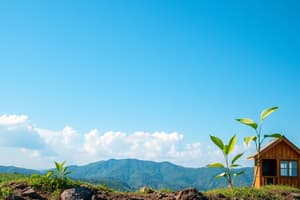Podcast
Questions and Answers
Czym jest kształtowana unikalna rola ludzi w różnorodnych ekosystemach?
Czym jest kształtowana unikalna rola ludzi w różnorodnych ekosystemach?
- Ich niską liczebnością w porównaniu do innych gatunków.
- Ich słabym zrozumieniem ekologii.
- Ich brakiem wpływu na zmiany w przyrodzie.
- Ich zdolnością szybkiej adaptacji do nowych środowisk. (correct)
Które cechy biologiczne ludzi dzielą z innymi naczelniakami, takimi jak szympansy i goryle?
Które cechy biologiczne ludzi dzielą z innymi naczelniakami, takimi jak szympansy i goryle?
- Odwrotnie skierowane oczy.
- Odwrotnie zgięte kolana.
- Zęby kłowe przystosowane do mięsa.
- Obręcz barkowa zapewniająca swobodne ruchy ramion. (correct)
Jakie działania człowieka mogą przyczynić się do utraty siedlisk, zmian w cyklach naturalnych i degradacji jakości powietrza?
Jakie działania człowieka mogą przyczynić się do utraty siedlisk, zmian w cyklach naturalnych i degradacji jakości powietrza?
- Zalesianie obszarów pustynnych.
- Produkcja energii odnawialnej.
- Recykling odpadów.
- Wprowadzanie gatunków inwazyjnych. (correct)
W jaki sposób postawa pionowa i zdolności komunikacyjne odróżniają ludzi od innych zwierząt?
W jaki sposób postawa pionowa i zdolności komunikacyjne odróżniają ludzi od innych zwierząt?
Jakie wnioski można wyciągnąć z historii ewolucji ludzi od wcześniejszych przodków hominidów?
Jakie wnioski można wyciągnąć z historii ewolucji ludzi od wcześniejszych przodków hominidów?
Kiedy ostatni wspólny przodek ludzi i szympansów żył?
Kiedy ostatni wspólny przodek ludzi i szympansów żył?
Która jest nasza klasa w systemie klasyfikacji biologicznej?
Która jest nasza klasa w systemie klasyfikacji biologicznej?
Jak ludzka działalność wpływa na populacje dzikiej przyrody?
Jak ludzka działalność wpływa na populacje dzikiej przyrody?
Jakie konsekwencje niesie za sobą fragmentacja siedlisk?
Jakie konsekwencje niesie za sobą fragmentacja siedlisk?
Jaki jest główny przekaz tekstu odnoszący się do relacji między ludźmi a naturą?
Jaki jest główny przekaz tekstu odnoszący się do relacji między ludźmi a naturą?
Flashcards are hidden until you start studying
Study Notes
Humans have a unique place among the diverse array of living organisms on Earth due to their complex ecological impact, shared traits, and evolving roles within various ecosystems. This position is shaped by our ability to adapt quickly to new environments and manipulate them according to our needs. Let's delve into these aspects more deeply.
Ecological Impact: Humans directly and indirectly affect every part of the biosphere through activities like agriculture, the introduction of invasive species, energy production, deforestation, pollution, and climate change. These actions can lead to loss of habitats, changes in natural cycles such as water flow, soil erosion, and air quality degradation. As the human population continues to grow exponentially, so does its influence over global ecosystems.
Shared Characteristics: Despite being highly adapted generalists capable of surviving almost anywhere on Earth, humans share many biological features with other primates, particularly those seen in great apes such as chimpanzees, gorillas, and bonobos. We all possess opposable thumbs, forward-facing eyes, and large brains relative to body size. However, it's also true that humans exhibit significant differences from other animals in terms of physical structures, most notably our upright posture and vocal communication abilities.
Evolutionary Relationships: The story of how humans evolved from earlier hominid ancestors provides insights into where we fit within the tree of life. Our last common ancestor with chimpanzees lived around seven million years ago, making us sister taxa - two separate lineages that diverged from a single ancestral species. Traces of this relationship remain visible when studying genetics; humans still carry DNA sequences inherited from our last common ancestor on different chromosomes compared to great apes. In essence, we belong to the kingdom Animalia, phylum Chordata, class Mammalia, order Primates, family Hominidae, genus Homo, and species sapiens.
Interactions With Other Species: Numerous studies show that wildlife populations are affected negatively by human activity. For instance, noise pollution caused by industrialization affects animal behavior and communication, thereby altering predator-prey dynamics. Human farming practices often lead to a decline in native plant communities, reducing food availability for herbivorous mammals. Furthermore, habitat fragmentation poses risks to both endangered species and rare plants. These realities highlight the interdependence between different species and underscore the need for sustainable management of resources and land usage practices.
In conclusion, humans occupy a distinctive space in the vast tapestry of life on Earth. Through our unique blend of adaptability, cognitive prowess, and technological advancements, alongside the capacity for extreme ecological impacts, we find ourselves playing increasingly influential roles across multiple spheres of existence. Understanding these positions and responsibilities helps set us on a path towards promoting harmony rather than discord between humanity and nature.
Studying That Suits You
Use AI to generate personalized quizzes and flashcards to suit your learning preferences.




